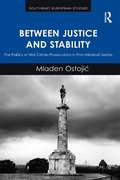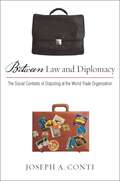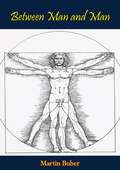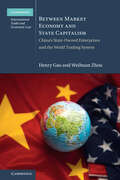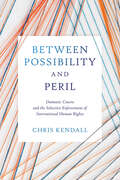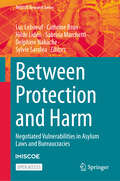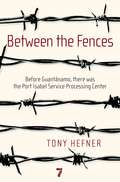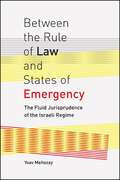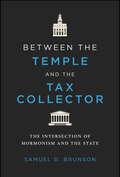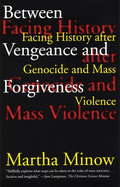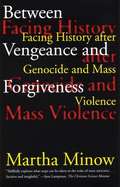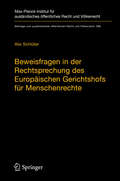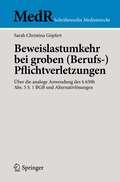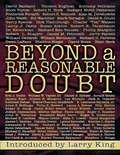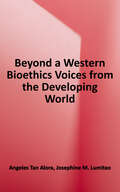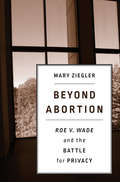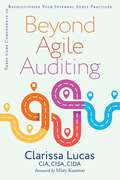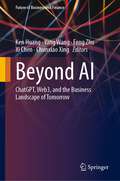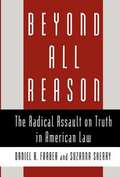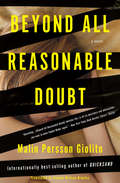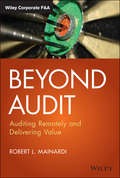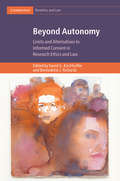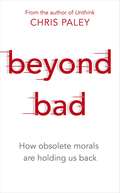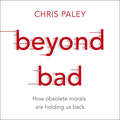- Table View
- List View
Between Justice and Stability: The Politics of War Crimes Prosecutions in Post-Miloševic Serbia (Southeast European Studies)
by Mladen OstojicExploring the impact of the International Criminal Tribunal (ICTY) on regime change in Serbia, this book examines the relationship between international criminal justice and democratisation. It analyses in detail the repercussions of the ICTY on domestic political dynamics and provides an explanatory account of Serbia's transition to democracy. Lack of cooperation and compliance with the ICTY was one of the biggest obstacles to Serbia's integration into Euro-Atlantic political structures following the overthrow of Milosevic. By scrutinising the attitudes of the Serbian authorities towards the ICTY and the prosecution of war crimes, Ostojic explores the complex processes set in motion by the international community's policies of conditionality and by the prosecution of the former Serbian leadership in The Hague. Drawing on a rich collection of empirical data, he demonstrates that the success of international judicial intervention is premised upon democratic consolidation and that transitional justice policies are only ever likely to take root when they do not undermine the stability and legitimacy of political institutions on the ground.
Between Law and Diplomacy: The Social Contexts of Disputing at the World Trade Organization
by Joseph A. ContiBetween Law and Diplomacy crafts an insider's look at international trade disputes at one of the most important institutions in the global economy-the World Trade Organization. The WTO regulates the global rules for trade, and-unique among international organizations-it provides a legalized process for litigation between countries over trade grievances. Drawing on interviews with trade lawyers, ambassadors, trade delegations, and trade jurists, this book details how trade has become increasingly legalized and the implications of that for power relations between rich and poor countries. Joseph Conti looks closely at who uses the system to initiate and pursue disputes, who settles and on what terms, and the relative disconnect between pursuing a dispute and what a country gains through efforts to gain compliance with WTO dictates. Through this inside look at the process of disputing, Conti provides fresh perspective on how and why the law authorizes the use of specific resources and tactics in the ever unfolding struggle for control in the global economy.
Between Man and Man (Routledge Classics Ser.)
by Martin BuberIn 1923 a small book was published which was to have enormous impact on more than one generation of theologians and philosophers of religion, Christian and Jew alike, as well as on countless laymen. The book was entitled I and Thou; the author was Martin Buber. Its main point was that all real life is encounter or meeting, to which a man must bring his whole being, his genuine self. This concern with dialogue has marked all Buber’s subsequent works. Between Man and Man takes this dialogical principle and in five related essays applies it to critical problems of modern life, such as politics and education.MARTIN BUBER was born in Vienna in 1878. Educated at the universities of Vienna, Berlin, Leipzig, and Zurich, he became editor of the Vienna Welt, a Zionist periodical. In 1916 he founded Der Jude, which rapidly became the principal voice of German-speaking Jewry and which he edited until 1924. He taught at the University of Frankfurt and directed the educational activities of the Jewish community there during the Nazi rise to power. In 1938 Buber left Germany for Jerusalem, where he was named professor of social philosophy at the Hebrew University. His works include books on Hasidism and Zionism as well as philosophy.
Between Market Economy and State Capitalism: China's State-Owned Enterprises and the World Trading System (Cambridge International Trade and Economic Law)
by Henry Gao Weihuan ZhouOne major issue facing the world trading system today is how to deal with the challenge of China's state capitalism. Many commentators believe that the existing WTO rules are insufficient and, thus new rules are needed. This book challenges this conventional wisdom. Through meticulous studies and fresh analysis of the commitments in China's WTO accession package, existing rules on state capitalism in WTO agreements and recent attempts to make new rules on these issues at the bilateral, regional and multilateral levels, this book argues that existing WTO rules, especially those on subsidies, coupled with China-specific rules in its accession protocol, do provide feasible tools to counter China's state capitalism. This book also discusses the reasons for the lack of usage of these rules and provides concrete policy suggestions on how the rules may be better utilized, as well as how to conduct constructive negotiations on new rules in the WTO and beyond.
Between Possibility and Peril: Domestic Courts and the Selective Enforcement of International Human Rights (Pennsylvania Studies in Human Rights)
by Chris KendallHow domestic courts in newly democratized states become willing and able to enforce international human rights lawWhen do domestic courts protect international human rights? By the end of the twentieth century, the world had witnessed an unprecedented flourishing of international human rights law and a growing number of democratic states whose domestic institutions promised to protect those rights. A single institution often became the center of these efforts: the court. Advocates in newly democratized states could look to high courts to demand that their governments comply with international law and bring policy into line with liberal rhetoric.This process, however, put these young courts in a difficult position. With no deep well of historical legitimacy to draw on in new political environments, courts had to weigh high-minded legal principles against the limited resources or political preferences of elected governments. In such situations, how did these courts respond, and what strategies allowed some to successfully build their legitimacy over time while others faltered, succumbing to political pressure or suffering political backlash?In Between Possibility and Peril, Chris Kendall explores this dynamic in three states—Colombia, Mexico, and South Africa—in the twenty years following each country’s democratic transition. The case studies reveal a common pattern: what matters most is not international law itself, but a court’s ability to control its procedural environment. Control over these “rules of the game” allows a court to selectively engage international human rights issues that can enhance its legitimacy and build public support while avoiding those issues likely to put it in direct conflict with hostile political actors. The result is paradoxical—the most successful courts in the long term are those who in the short term often choose to disappoint rights advocates.
Between Protection and Harm: Negotiated Vulnerabilities in Asylum Laws and Bureaucracies (IMISCOE Research Series)
by Luc Leboeuf Cathrine Brun Hilde Lidén Sabrina Marchetti Delphine Nakache Sylvie SaroleaThis open access book dissects the current narratives of ‘vulnerability’ in asylum laws and policies, by unpacking the meanings, productions, and performances, of ‘vulnerability’ in different contexts, from countries of first asylum in the Global South to Europe and Canada. It discusses how the increased reliance on ‘vulnerability’ to guide states’ replies to refugee movements improves refugee protection, while also generating contestations and exclusionary effects that may cause harm. Based on data collected as part of the EU Horizon 2020 VULNER project, the book examines existing legal and bureaucratic approaches to refugees’ vulnerabilities, which it confronts with the refugees’ experiences and understandings of their own life challenges. It analyses the perspectives from state actors, humanitarian organisations, and social and aid workers, as well as the refugees themselves. By emphasizing how these perspectives relate and feed into each other, the book unpacks the humanitarian replies from states and the international community to refugee movements – including in their implied exclusionary dimensions that generate contestations and implementation difficulties which, if not tackled and understood properly, risk exacerbating and/or producing vulnerabilities among refugees.
Between the Fences: Before Guantanamo, there was the Port Isabel Service Processing Center
by Tony HefnerSomething at the Texas detention facility is terribly wrong, and Tony Hefner knows it. But the guards are repeatedly instructed not to speak of anything they witness. In the Rio Grande Valley, one of the most poverty-stricken areas in the United States, good jobs are scarce and the detention facility pays the best wages for a hundred miles. The guards follow orders and keep quiet.For six years, Tony Hefner was a security guard at the Port Isabel Service Processing Center, one of the largest immigration detention centers in America, and witnessed alarming corruption and violations of basic human rights. Officers preyed upon the very people whom they are sworn to protect. On behalf of the 1,100 men, women, and children residing there on an average day, and the 1,500 new undocumented immigrants who pass through its walls every month, this is the story of the systematic sexual, physical, financial, and drug-related abuses of detainees by guards.
Between the Rule of Law and States of Emergency: The Fluid Jurisprudence of the Israeli Regime
by Yoav MehozayHonorable Mention, 2017 Yonathan Shapiro Award for Best Book in Israel Studies presented by the Association for Israel StudiesContemporary debates on states of emergency have focused on whether law can regulate emergency powers, if at all. These studies base their analyses on the premise that law and emergency are at odds with each other. In Between the Rule of Law and States of Emergency, Yoav Mehozay offers a fundamentally different approach, demonstrating that law and emergency are mutually reinforcing paradigms that compensate for each other's shortcomings. Through a careful dissection of Israel's emergency apparatus, Mehozay illustrates that the reach of Israel's emergency regime goes beyond defending the state and its people against acts of terror. In fact, that apparatus has had a far greater impact on Israel's governing system, and society as a whole, than has traditionally been understood. Mehozay pushes us to think about emergency powers beyond the "war on terror" and consider the role of emergency with regard to realms such as political economy.
Between the Temple and the Tax Collector: The Intersection of Mormonism and the State
by Samuel D. BrunsonThe founding and development of the Church of Jesus Christ of Latter-day Saints run parallel to the rise of the modern tax system and administrative state. Samuel D. Brunson looks at the relationships between the Church and various federal, state, local, and international tax regimes. The church and its members engage with the state as taxpayers and as members of a faith exempt from taxes. As Brunson shows, LDS members and the Church have at various times enacted, enforced, and collected taxes while also challenging taxes in the courts and politics. Brunson delves into the ways LDS members used their status as taxpayers to affirm themselves as citizens and how outsiders have attacked the Church’s tax-exempt status to delegitimize it. Throughout, Brunson uses the daily interactions between the Latter-day Saints and taxation to explain important and inevitable holes in the wall between church and state. Enlightening and informed, Between the Temple and the Tax Collector provides general readers and experts alike with a new perspective on a fundamental issue.
Between Vengeance and Forgiveness
by Martha MinowThe rise of collective violence and genocide is the twentieth century's most terrible legacy. Martha Minow, a Harvard law professor and one of our most brilliant and humane legal minds, offers a landmark book on our attempts to heal after such large-scale tragedy. Writing with informed, searching prose of the extraordinary drama of the truth commissions in Argentina, East Germany, and most notably South Africa; war-crime prosecutions in Nuremberg and Bosnia; and reparations in America, Minow looks at the strategies and results of these riveting national experiments in justice and healing.
Between Vengeance and Forgiveness: Facing History after Genocide and Mass Violence
by Martha MinowThis is a book on justice and healing after horrific violence. Remembering and forgetting, judging and forgiving, reconciling and avenging, grieving and educating - the author Martha Minow shows us why each may be necessary, yet painfully inadequate, as individuals and societies confront past horrors.
Beweisfragen in der Rechtsprechung des Europäischen Gerichtshofs für Menschenrechte (Beiträge zum ausländischen öffentlichen Recht und Völkerrecht #288)
by Alix SchlüterDieses Buch analysiert auf der Grundlage mehrerer hundert Urteile erstmals umfassend das Beweisrecht des EGMR. Untersucht werden verschiedene Referenzgebiete, in denen typischerweise Nachweisschwierigkeiten auftreten: Situationen der Informationsasymmetrie zwischen beklagter Konventionspartei und Beschwerdeführer, Fälle objektiver Ungewissheit von Tatsachen – in der Umweltrechtsprechung und in Fällen von Ausweisungen und Auslieferungen – und Diskriminierungsbeschwerden. Die Autorin zeigt auf, dass ein enger Zusammenhang zwischen Beweisrecht und materiellem Konventionsrecht besteht. Das Buch kommt zu dem Ergebnis, dass der Gerichtshof Probleme, die als Fragen des Nachweises von beweisbedürftigen Tatsachen eigentlich dem Beweisrecht, mithin dem Prozessrecht zuzuordnen wären, vielfach über die Auslegung des materiellen Rechts löst.
Beweislastumkehr bei groben: Über die analoge Anwendung des § 630h Abs. 5 S. 1 BGB und Alternativlösungen (MedR Schriftenreihe Medizinrecht)
by Sarah Christina GöpfertDieses Buch analysiert eine 2017 angestoßene Tendenz der höchstrichterlichen Rechtsprechung, wonach die aus dem Arzthaftungsrecht stammende Beweisregel der Beweislastumkehr beim groben Behandlungsfehler auf andere Berufsgruppen ausgeweitet wird. In einem ersten Hauptteil werden umfangreich die Grundlagen zur Regelung des § 630h Abs. 5 S. 1 BGB dargestellt; deren rechtsgeschichtliche Entwicklung, deren Stärken und Schwächen, sowie Alternativlösungen für das Beweisproblem bei der Kausalität im Arzthaftungsrecht. Im darauffolgenden Hauptteil wird sodann die Entwicklung zur Anwendung der Vorschrift außerhalb des Arzthaftungsrechts beleuchtet, beginnend mit einer umfassenden Auswertung von Entscheidungen seit dem Jahr 1962, die eine entsprechende Anwendung der Beweislastregel in Erwägung gezogen haben. Im Anschluss wird diese Entwicklung nach einer Festlegung der methodischen Bewertungsgrundlagen nach Fallgruppen differenziert beurteilt. So wird im Ergebnis eine subsumtionsfähige Formel für künftige Fälle erarbeitet, die über die Zulässigkeit einer Analogie zu § 630h Abs. 5 S. 1 BGB entscheidet. Schlussendlich wird ein rechtspolitischer Vorschlag für eine Alternativregelung unterbreitet, die nicht an die viel kritisierte Beweislastumkehr anknüpft. Der Leser erhält so einen umfassenden Überblick zu der sich aktuell vollziehenden Rechtsfortbildung. Das Ergebnis ist ein Kompromiss aus den unübersehbaren Beweisnöten in den gegenständlichen Fällen auf der einen Seite, sowie dem Anliegen auf der anderen Seite, den Anwendungsbereich der Regelung zu begrenzen, um nicht das gesamte Haftungsrecht damit zu infiltrieren.
Beyond a Reasonable Doubt
by Larry King“ Beyond a reasonable doubt” is heard countless times every day in courtrooms around the country. And yet the standard represented by this phrase is nowhere mentioned in the constitution. Nor is it defined anywhere in our laws. What, then, does it really mean? How can it be interpreted? In Beyond a Reasonable Doubt, more than 80 influential scholars, attorneys, novelists, journalists, and religious figures— including Vice President Kamala Harris— discuss, explore, interpret, and define the phrase and its meaning. Featuring contributions from David Baldacci, Vincent Bugliosi, Frederick Forsyth, Jack Kevorkian, Robert Shapiro, and Scott Turow, among others, this collection of essays, Beyond a Reasonable Doubt— edited and introduced by Larry King— is essential reading for anyone with an interest in how our justice system works today and how it will work in the future.
Beyond a Western Bioethics: Voices from the Developing World (Clinical Medical Ethics Ser.)
by Angeles Tan Alora Josephine M. LumitaoIn this book, physicians Angeles Tan Alora and Josephine M. Lumitao join eight other contributors to provide a comprehensive exploration of bioethical issues outside of the dominant American and western European model. Using the Philippines as a case study, they address how a developing country's economy, religion, and culture affect the bioethical landscape for doctors, patients, families, and the society as a whole. American principles of medical ethics assume the primacy of individual autonomy, the importance of truth-telling, and secular standards of justice and morality. In the Philippines, these standards are often at odds with a culture in which family relationships take precedence over individualism, and ideas of community, friendship, and religion can deeply influence personal behavior. Pervasive poverty further complicates the equation. Contributors move from a general discussion of the moral vision informing health care decisions in the Philippines to an exploration of a wide range of specific cases: family planning, care of the elderly, organ transplants, death and dying, medical research, AIDS care, doctor-patient relationships, informed consent, and the allocation of scarce health-care resources. Written for both students and professionals, the book provides a much-needed perspective on how medical ethics are practiced in a developing nation, and it successfully challenges the wisdom of global bioethical standards that do not account for local cultural and economic differences.
Beyond Abortion: <i>Roe v. Wade</i> and the Battle for Privacy
by Mary Ziegler ZieglerFor most Americans today, Roe v. Wade concerns just one thing: the right to choose abortion. But the Supreme Court’s decision once meant much more. The justices ruled that the right to privacy encompassed the abortion decision. Grassroots activists and politicians used Roe—and popular interpretations of it—as raw material in answering much larger questions: Is there a right to privacy? For whom, and what is protected? As Mary Ziegler demonstrates, Roe’s privacy rationale attracted a wide range of citizens demanding social changes unrelated to abortion. Movements questioning hierarchies based on sexual orientation, profession, class, gender, race, and disability drew on Roe to argue for an autonomy that would give a voice to the vulnerable. So did advocates seeking expanded patient rights and liberalized euthanasia laws. Right-leaning groups also invoked Roe’s right to choose, but with a different agenda: to attack government involvement in consumer protection, social welfare, racial justice, and other aspects of American life. In the 1980s, seeking to unify a fragile coalition, the Republican Party popularized the idea that Roe was a symbol of judicial tyranny, discouraging anyone from relying on the decision to frame their demands. But Beyond Abortion illuminates the untapped potential of arguments that still resonate today. By recovering the diversity of responses to Roe, and the legal and cultural battles it energized, Ziegler challenges readers to come to terms with the uncomfortable fact that privacy belongs to no party or cause.
Beyond Agile Auditing: Three Core Components to Revolutionize Your Internal Audit Practices
by Clarissa LucasBeyond Agile Auditing shows auditors and organizational leaders how to revolutionize the audit experience.For decades, auditors have unintentionally struck fear in their clients. They are rarely welcomed into an area with open arms and are often viewed as one more obstacle to delivering value. But internal audit serves a vital function in reducing risk and ensuring success for all organizations.In Beyond Agile Auditing, experienced audit and risk management leader Clarissa Lucas shows organizations how to go beyond collaboration and build a partnership between auditors and clients. By leveraging this partnership, organizations can experience more value-added audit work, faster time to results (and resolution), greater engagement and satisfaction from all parties involved, and gain a competitive advantage in the marketplace,By building upon the work of the DevOps community, which reinvented the relationship between two groups that historically saw each other as adversaries and obstacles, Lucas applies new and better ways of working to the audit process. In this reimagined world, auditors (as well as other assurance providers) work closely with their clients to become strategic differentiators instead of obstacles, providing stakeholders value they never imagined. Come join us in this brave new world of audit.
Beyond AI: ChatGPT, Web3, and the Business Landscape of Tomorrow (Future of Business and Finance)
by Ken Huang Yang Wang Feng Zhu Xi Chen Chunxiao XingThis book explores the transformative potential of ChatGPT, Web3, and their impact on productivity and various industries. It delves into Generative AI (GenAI) and its representative platform ChatGPT, their synergy with Web3, and how they can revolutionize business operations. It covers the potential impact surpassing prior industrial revolutions.After providing an overview of GenAI, ChatGPT, and Web3, it investigates business applications in various industries and areas, such as product management, finance, real estate, gaming, and government, highlighting value creation and operational revolution through their integration. It also explores their impact on content generation, customer service, personalization, and data analysis and examines how the technologies can enhance content quality, customer experiences, sales, revenue, and resource efficiency. Moreover, it addresses security, privacy, and ethics concerns, emphasizing the responsible implementation of ChatGPT and Web3. Written by experts in this field, this book is aimed at business leaders, entrepreneurs, students, investors, and professionals who are seeking insights into ChatGPT, ChatGPT Plug-in, GPT-based autonomous agents, and the integration of Gen AI and Web3 in business applications.
Beyond All Reason
by Daniel A. Farber Suzanna SherryWould you want to be operated on by a surgeon trained at a medical school that did not evaluate its students? Would you want to fly in a plane designed by people convinced that the laws of physics are socially constructed? Would you want to be tried by a legal system indifferent to the distinction between fact and fiction? These questions may seem absurd, but these are theories being seriously advanced by radical multiculturalists that force us to ask them. These scholars assert that such concepts as truth and merit are inextricably racist and sexist, that reason and objectivity are merely sophisticated masks for ideological bias, and that reality itself is nothing more than a socially constructed mechanism for preserving the power of the ruling elite. In Beyond All Reason, liberal legal scholars Daniel A. Farber and Suzanna Sherry mount the first systematic critique of radical multiculturalism as a form of legal scholarship. Beginning with an incisive overview of the origins and basic tenets of radical multiculturalism, the authors critically examine the work of Derrick Bell, Catherine MacKinnon, Patricia Williams, and Richard Delgado, and explore the alarming implications of their theories. Farber and Sherry push these theories to their logical conclusions and show that radical multiculturalism is destructive of the very goals it wishes to affirm. If, for example, the concept of advancement based on merit is fraudulent, as the multiculturalists claim, the disproportionate success of Jews and Asians in our culture becomes difficult to explain without opening the door to age-old anti-Semitic and racist stereotypes. If historical and scientific truths are entirely relative social constructs, then Holocaust denial becomes merely a matter of perspective, and Creationism has as much "validity" as evolution. The authors go on to show that rather than promoting more dialogue, the radical multiculturalist preferences for legal storytelling and identity politics over reasoned argument produces an insular set of positions that resist open debate. Indeed, radical multiculturalists cannot critically examine each others' ideas without incurring vehement accusations of racism and sexism, much less engage in fruitful discussion with a mainstream that does not share their assumptions. Here again, Farber and Sherry show that the end result of such thinking is not freedom but a kind of totalitarianism where dissent cannot be tolerated and only the naked will to power remains to settle differences. Sharply written and brilliantly argued, this book is itself a model of the kind of clarity, civility, and dispassionate critical thinking which the authors seek to preserve from the attacks of the radical multiculturalists. With far-reaching implications for such issues as government control of hate speech and pornography, affirmative action, legal reform, and the fate of all minorities, Beyond All Reason is a provocative contribution to one of the most important controversies of our time.
Beyond All Reasonable Doubt: A Novel
by Malin Persson GiolitoFrom the award-winning author of Quicksand, a gripping legal thriller that follows one woman's conflicted efforts to overturn what may be a wrongful conviction. I'm giving you a chance to achieve every lawyer's dream, said Sophia Weber's old professor. Freeing an innocent man. Thirteen years ago, a fifteen-year-old girl was murdered. Doctor Stig Ahlin was sentenced to life in prison. But no one has forgotten the brutal crime. Ahlin is known as one of the most ruthless criminals.When Sophia Weber discovers critical flaws in the murder investigation, she decides to help Ahlin. But Sophia doing her utmost to get her client exonerated arouses many people's disgust. And the more she learns, the more difficult her job becomes. What kind of man is her client really? What has he done? And will she ever know the truth?
Beyond Audit: Auditing Remotely and Delivering Value (Wiley Corporate F&A)
by Robert L. MainardiYour game plan for strategic success in today’s remote audit department Beyond Audit is your guide to taking advantage of this unique moment to review and enhance your audit methodology to improve execution, operations, and audit product. Change has been thrust upon the audit industry, and every company must adapt to business interruptions and remote work environments. Now is the perfect time for audit departments to step back and turn a critical eye on their own operations. We have an opportunity to identify new ways of increasing product offerings and building more effective and efficient operations, ultimately creating better results for our partners and clients. This book will take you from a foundational understanding of the business environment through to a reflective review of your own operational effectiveness and efficiency. You’ll gain access to the Audit Risk Barometer (ARB), an innovative self-assessment tool that scores audit department strengths and opportunities for improvement. This book also includes a detailed methodology for working with your business partner to ensure clear identification of business objectives. You’ll also learn how to identify “true process risks” to ensure that testing remains focused and adds value. Finally, you'll learn critical skills and team development ideas for every level. Gain a fundamental understanding of today's business environment and how traditional and remote auditing fits into the new business puzzle Use the exclusive Audit Risk Barometer to conduct a valuable self-assessment and uncover your team’s strengths and weaknesses Learn how to effectively and efficiently work with your business partner to identify objectives and value-add opportunities Access online resources, including video summaries and interactive tools to revamp your audit department Beyond Audit incorporates links to online video summaries, templates mentioned throughout the book, interviews with experienced professionals, and an audit tracking software tool. This book is an enormously valuable resource for audit teams of any size and shape.
Beyond Autonomy: Limits and Alternatives to Informed Consent in Research Ethics and Law (Cambridge Bioethics and Law)
by David G. Kirchhoffer Bernadette J. RichardsRespect for autonomy has become a fundamental principle in human research ethics. Nonetheless, this principle and the associated process of obtaining informed consent do have limitations. This can lead to some groups, many of them vulnerable, being left understudied. This book considers these limitations and contributes through legal and philosophical analyses to the search for viable approaches to human research ethics. It explores the limitations of respect for autonomy and informed consent both in law and through the examination of cases where autonomy is lacking (infants), diminished (addicts), and compromised (low socio-economic status). It examines alternative and complementary concepts to overcome the limits of respect for autonomy, including beneficence, dignity, virtue, solidarity, non-exploitation, vulnerability and self-ownership. It takes seriously the importance of human relationality and community in qualifying, tempering and complementing autonomy to achieve the ultimate end of human research - the good of humankind.
Beyond Bad: How obsolete morals are holding us back
by Chris Paley'Brilliantly unillusioned thinking... It could hardly be more necessary in these all-too-moralistic times' - James Marriott, THE TIMESMorals have held empires together, kept soldiers marching under fire, fed the hungry, passed laws, built walls, welcomed immigrants, destroyed careers and governed our sex lives. But what if morality's all meaningless rubbish, a malfunctioning relic of our evolutionary past? This is the provocative argument that Chris Paley makes. This isn't an attack on one set of moral codes or one way of thinking about ethics: it's a call for abolishing the whole caboodle.He uses evolutionary psychology to show how and why morality emerged: theyenabled our forebears to survive and prosper in tribal groups. Today, our morals constrain us, bias us, and push us in the wrong direction. The biggest challenges our species faces, whether global warming, nuclear proliferation or the rise of the robots, are pan-human. These challenges are beyond what our moral minds were designed to cope with. You can't build smartphones with stone-age axes, and you can't solve modern humanity's problems with tools that are designed to create primitive, competitive groups.From Chris Paley, author of the 'extraordinary', 'startling' and 'thought-provoking' Unthink, comes Beyond Bad, which shows morals hinder us from achieving what we want to achieve. Beyond Bad is the book that 'does for morals what Dawkins did for God'.
Beyond Bad: How obsolete morals are holding us back
by Chris Paley'Truly thought-provoking. Paley puts forth an astonishingly original hypothesis and defends it eloquently, marshalling cutting-edge science to argue against the very idea of morality.'Kurt Gray, Associate Professor, University of North Carolina, Chapel Hill'There is a serious challenge here to received ways of thinking for the lay public and professional moral philosophers alike.' John P Burgess, John N Woodhull Professor of Philosophy, Princeton UniversityMorals have held empires together, kept soldiers marching under fire, fed the hungry, passed laws, built walls, welcomed immigrants, destroyed careers and governed our sex lives. But what if morality's all meaningless rubbish, a malfunctioning relic of our evolutionary past? This is the provocative argument that Chris makes. This isn't an attack on one set of moral codes or one way of thinking about ethics: it's a call for abolishing the whole caboodle.He uses evolutionary psychology to show how and why morality emerged: theyenabled our forebears to survive and prosper in tribal groups. Today, our morals constrain us, bias us, and push us in the wrong direction. The biggest challenges our species faces, whether global warming, nuclear proliferation or the rise of the robots, are pan-human. These challenges are beyond what our moral minds were designed to cope with. You can't build smartphones with stone-age axes, and you can't solve modern humanity's problems with tools that are designed to create primitive, competitive groups.From Chris Paley, author of the 'extraordinary', 'startling' and 'thought-provoking' Unthink, comes Beyond Bad, which shows morals hinder us from achieving what we want to achieve. Beyond Bad is the book that 'does for morals what Dawkins did for God'.
Beyond Bad: How obsolete morals are holding us back
by Chris Paley'Brilliantly unillusioned thinking... It could hardly be more necessary in these all-too-moralistic times' - James Marriott, THE TIMES'There is a serious challenge here to received ways of thinking for the lay public and professional moral philosophers alike.' John P Burgess, John N Woodhull Professor of Philosophy, Princeton UniversityScientific research has achieved what thousands of years of philosophising failed to do: explain why we have morals and how they work. The answers are surprising and frequently disturbing.Morals have held empires together, kept soldiers marching under fire, fed the hungry, passed laws, built walls, welcomed immigrants, destroyed careers and governed our sex lives. But what if morality's all meaningless rubbish, a malfunctioning relic of our evolutionary past?This is the provocative argument that Chris makes. This isn't an attack on one set of moral codes or one way of thinking about ethics: it's a call for abolishing the whole caboodle.He uses evolutionary psychology to show how and why morality emerged: they enabled our forebears to survive and prosper in tribal groups. Today, our morals constrain us, bias us, and push us in the wrong direction.The biggest challenges our species faces, whether global warming, nuclear proliferation or the rise of the robots, are pan-human. These challenges are beyond what our moral minds were designed to cope with. You can't build smartphones with stone-age axes, and you can't solve modern humanity's problems with tools that are designed to create primitive, competitive groups.From Chris Paley, author of the 'extraordinary', 'startling' and 'thought-provoking' Unthink, comes Beyond Bad, which shows morals hinder us from achieving what we want to achieve. Beyond Bad is the book that 'does for morals what Dawkins did for God'. (P) 2021 Hodder & Stoughton Ltd
